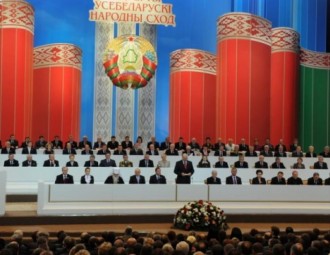Lukashenka: The Belarusian People's Congress is one of the most important forms of direct democracy

It is a real mechanism of grass-roots democracy, the president said in his opening address at the 5th Belarusian People's Congress held at the Palace of the Republic in Minsk.
“The right of the person and the citizen to take part in managing state affairs is a necessity of the times,” the Belarusian leader said, speaking to a gathering of 2,500 delegates who had been selected through an obscure process.
“People of different ages, generations and occupations, you represent the population of our entire country, all the regions of the Motherland,” Lukashenka said. “The nation has entrusted you with huge responsibility. Together we should make decisions on the most important matters concerning the development of the Belarusian state and our society.”
The Belarusian People's Congress is really one of the most important forms of direct democracy and a public institution that has proved its value in present-day Belarus, Lukashenka noted. “An open and honest talk with people has become part of life for the government and all public servants in the country,” he stressed.
The Belarusian People’s Congress is not a formal event and not a tradition, but a time-tested and direct link between the government and the people, Lukashenka said. “It is an opportunity to calmly and thoroughly review the results of the past years and outline a strategy for the future,” he added.
The Fifth Belarusian People’s Congress was initially expected to be held in culmination of Lukashenka’s reelection campaign in the fall of 2015, just like the previous four, BelaPAN recalls. Critics speculated that Lukashenka broke the tradition because of his failure to deliver on promises that he had made five years before.
Economic failures might be the reason he decided against holding the Congress before last year’s presidential election. The government had promised that Belarus’ GDP would grow by 62 to 68 percent in the 2011-2015 period, but it actually rose by about six percent. Industrial output rose by 5.7 percent instead of the promised 54 to 60 percent. The labor productivity rate rose by 12 percent instead of the promised 63 to 68 percent.
Lukashenka won a presidential election in 2010 after he promised at the Fourth Belarusian People’s Congress that average monthly pay in the country would rise from $500 to $1,000 by 2015. However, pre-tax monthly pay in July 2015 averaged out at about $460.
Lukashenka explained in his opening address on Wednesday that the Belarusian People's Congress was being held now, and not on the eve of last year’s presidential election because such events should be held when “it is possible and necessary to analyze the real results of five-year work, assess achievements and mistakes, and gain a deep understanding of global economic trends.” “It is only on these conditions that decisions can be accurate, well-founded and well-thought-out.”
Lukashenka suggested that the analysis of the country’s social and economic development should not be limited to the results of the most recent year.
Lukashenka noted that another lesson of the war was that the Belarusians should be on the alert and should not have a careless attitude towards the future. “We should not let us get caught off guard, as was the case in those years,” he said. “We should be able to foresee and prevent a danger. There is peace, quiet and proper order in Belarus at present. We live on our own country. We are not rich, but we have a sufficiency. We can see on the example of our neighbors that peace is the greatest value. It can be lost easily. The road from peace to war can be very short.”
-
03.01
-
07.10
-
22.09
-
17.08
-
12.08
-
30.09








































